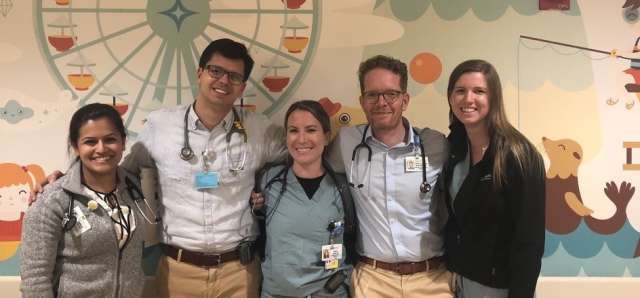Mentorship

Our program takes pride in the accessibility of the learning environment, as well as faculty and fellow dedication to resident education. Many factors optimize this environment, including:
Adviser Feedback Meetings: biannual meetings between assigned faculty advisers and residents. The meetings are designed to give comprehensive feedback about each resident's development as a pediatrician. Each meeting reviews feedback from each rotation and other curriculum components, including:
- Faculty, Peer, and Patient Evaluations
- Teaching Evaluations (from medical students, etc.)
- Observed History and Physicals
- Evidence Based Medicine Evaluations
- Procedure Logs, Conference Attendance, Duty hours
- In-training Exam Scores
- Electives and Subspecialty Experiences
- Scholarly Activities such a research, etc.
- Career training and professional advice
- Resident's individual goals
Research Mentorship: Many residents seek research opportunities over the course of their training, including choosing to do a research elective for more intensive periods of focus on their projects. Residents have been able to publish and present their research in a variety of settings. Residents typically identify mentors through several mechanisms - taking over another resident's project, through the guidance of their feedback advisor, from working together with faculty on a clinical rotation, joining an interest group, among others.
Community Projects: Most mentorship on community projects has come from the previous Community Health and Advocacy Training Program faculty (CHAT) and now Primary Care and Public Health faculty (PHABB), or faculty in the Center for Adolescent Health Promotion through UCLA/RAND. Over the last 10-years, residents have had an incredible impact on the community surrounding UCLA and its clinics.
Senior/Intern Support: Residents receive peer and chief-resident mentorship through monthly support meetings during a noon-conference time. There is little or no formal agenda, but instead driven by what the interns and residents want to discuss.
Program Leadership Open-Door Policy: We are happy to be available at any time to our residents, as we recognize that some of the most critical times for mentorship or advising cannot be planned in advance. All medical education faculty have an open door policy for spontaneous visits whenever needed by a resident.
Resident as Teacher Elective: We are committed to excellence in education at all levels, including nurturing and developing the educational skills of our residents. We provide workshops and educational skills training during orientation sessions for both first and second year residents as well as in setting such as annual retreats. We offer a "resident as teacher" elective to our senior residents, as well as mentoring for educational skills as part of the curricula for many required rotations.